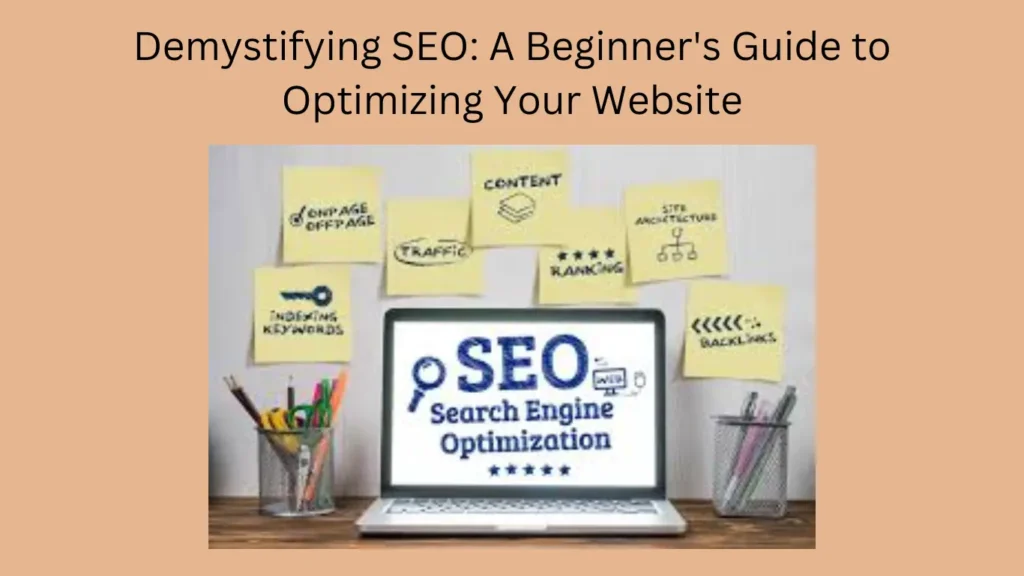Search Engine Optimization (SEO) is often perceived as a complex and mysterious field, but at its core, it’s about making your website more accessible and relevant to search engines and users alike. For beginners looking to optimize their website, understanding the basics of SEO can be transformative. This guide will walk you through fundamental concepts and practical steps to help you get started with SEO, focusing on creating helpful, reliable, and people-first content.
What is SEO?
SEO stands for Search Engine Optimization. It involves various strategies and practices aimed at improving your website’s visibility in search engine results pages (SERPs). The goal is to attract more organic (non-paid) traffic to your site by making it more relevant to users’ search queries.
Key Components of SEO
- Keyword Research
- What It Is: Determining the terms and expressions that members of your target audience use when looking for information about your website.
- Method: To locate appropriate keywords, use tools like as Ahrefs, SEMrush, or Google Keyword Planner. Put more emphasis on long-tail keywords, or more specialized phrases, as they frequently have more conversion potential and less competition
- .On-Page SEO
- What It Is: Optimizing individual pages on your website to rank higher and earn more relevant traffic.
- Key Elements:
- Meta Descriptions: Write clear and engaging descriptions that encourage users to click through.
- Content: Create high-quality, useful content that answers users’ queries and incorporates relevant keywords naturally.
- Technical SEO
- What It Is: Increasing your website’s technical specifications so that search engines can efficiently crawl and index it.
- Important components:
- Website Speed: To provide users a positive experience, make sure your website loads promptly.
- Mobile-Friendliness: Make sure your website is optimized for mobile platforms, as a considerable portion of internet traffic originates from tablets and smartphones.
- XML Sitemap: To assist search engines in finding and indexing your pages, create and submit a sitemap.
- You can specify which pages search engines can crawl by using the Robots.txt file.
- Off-Page SEO
- What It Is: Enhancing your website’s authority and reputation through external factors.
- Key Elements:
- Social Media: Promote your content on social media platforms to drive traffic and increase visibility.
- Local SEO: Optimize your site for local search queries if you have a local business.
- User Experience (UX)
- What It Is: Ensuring that visitors have a positive experience when they visit your website.
- Key Elements:
- Navigation: Make it easy for users to find what they’re looking for with a clear and intuitive menu.
- Content Quality: Ensure your content is relevant, useful, and easy to understand.
Practical Steps to Get Started
- Set Clear Goals
- Define what you want to achieve with your SEO efforts, such as increasing organic traffic, improving search engine rankings, or generating more leads.
- Create a Content Plan
- Develop a content strategy that includes regular updates, blog posts, and other valuable content that addresses your audience’s needs and incorporates relevant keywords.
- Monitor and Adjust
- Regularly track your SEO performance using analytics tools. Monitor keyword rankings, traffic, and user behavior to understand what’s working and what needs adjustment.
- Stay Updated
- SEO is an ever-evolving field. Keep yourself informed about the latest trends and algorithm updates through reputable SEO blogs, forums, and industry news.
Conclusion
SEO doesn’t have to be overwhelming. By focusing on the fundamental aspects of keyword research, on-page and technical SEO, off-page factors, and user experience, you can start optimizing your website effectively. Remember, SEO is a continuous process that requires patience and ongoing effort. By creating helpful, reliable, and people-first content, you’ll not only improve your search engine rankings but also provide value to your audience, fostering long-term success for your website.
For further Inquires Contact Us
FAQs
Describe SEO and explain its significance?
SEO stands for Search Engine Optimization. It improves your website’s visibility in search engines, helping you attract more organic traffic and reach your target audience effectively.
How do I start with keyword research?
Start by identifying pertinent keywords for your content using tools like Ahrefs or Google Keyword Planner. In order to target specific inquiries and lessen competition, concentrate on long-tail keywords.
What constitutes on-page SEO’s core components?
Key elements include optimizing title tags, meta descriptions, headings, and content. Ensure your URLs are descriptive and include relevant keywords for better search engine rankings.
Why is technical SEO important?
Technical SEO makes sure that your website can be efficiently crawled and indexed by search engines. It involves optimizing site speed, mobile-friendliness, and using XML sitemaps to improve overall site performance.
How can I improve user experience (UX) on my website?
Enhance UX by ensuring easy navigation, a clean and professional design, and high-quality, relevant content.

